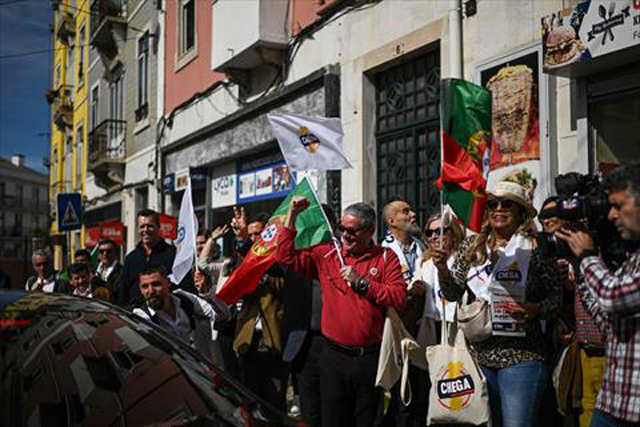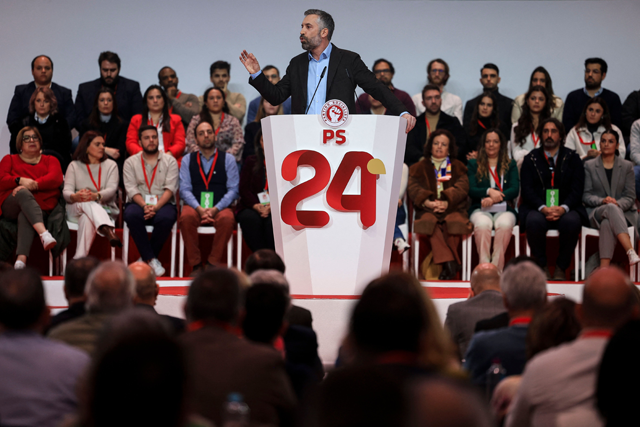You are here
Portugal electoral campaign begins with right looking to gain
By AFP - Feb 25,2024 - Last updated at Feb 25,2024

CHEGA party supporters hold flags during a rally in Graca neighbourhood, Lisbon, on February 20 (AFP photo)
LISBON — Portugal’s official election campaign begins Sunday, with the March 10 legislative vote likely to see a breakthrough by populist parties after an influence peddling scandal brought down eight years of Socialist government.
Portugal, which this April celebrates half a century since its “Carnation Revolution” put an end to an almost equally long fascist dictatorship, has avoided the right-wing and anti-establishment parties that have recently scored successes elsewhere in Europe.
That exception is expected to end.
The Chega Party (“Enough” in Portuguese), formed in 2019 by a former football commentator who has become an ardent critic of the country’s political and economic elites, is credited with 15 to 20 per cent of the vote.
The surprise resignation of Socialist Prime Minister Antonio Costa, who is not running for re-election, has helped Chega, said Antonio Costa Pinto, a political scientist at the Institute of Social Sciences, University of Lisbon.
“The theme of corruption, in this European conjuncture, favours the radical right,” he said.
Several European countries, including Italy, Slovakia, Hungary and Finland, are run by coalitions either headed by or including far-right parties.
The Netherlands could join this list after the victory of Geert Wilders in last November’s legislative elections.
Chega, which is anti-immigrant but not always anti-European Union, already became the country’s third largest political force in Portugal’s January 2022 elections with seven per cent of the vote and 12 deputies in the 230-seat parliament.
Andre Ventura, its president, aims to displace the centre-right Social Democratic Party (PSD) as the dominant force on Portugal’s right, which is expected to have a majority of the seats in parliament.
For the moment, the PSD is slightly ahead in the polls with about 30 per cent of the vote, just in front of the incumbent Socialist Party.
PSD leader Luis Montenegro, who has formed an alliance with two small conservative parties, has for the moment ruled out any coalition with Chega.
‘No is no’
“No is no,” Montenegro repeats each time the question is asked.
Costa’s successor at the Socialist Party, Pedro Nuno Santos, has said he wouldn’t block the formation of a minority government headed by the centre-right should they finish first but without a working majority.
But according to analyst Costa Pinto, the “sanitary cordon around the extreme right hasn’t worked in other European democracies, and Portugal will be another example”.
Prime minister since the end of 2015, Costa improved the government’s finances and oversaw a largely healthy economy, but was brought down by a series of scandals.
The final blow came when a probe into influence peddling reached his own chief of staff, who was found with 75,800 euros ($82,000) in cash hidden in his office.
Costa’s name was cited in the probe and he resigned in November, saying he wouldn’t seek a new term.
Related Articles
LISBON — Portugal was due to name its new prime minister on Wednesday once the final results of its March 10 election are announced after th
LISBON — Voters in Portugal went to the polls Sunday in an early election that could see the country join a shift to the right across Europe
LISBON — Nine weeks out from snap elections, Portugal’s ruling Socialist Party (PS) on Sunday formalised Pedro Nuno Santos as their new lead


















